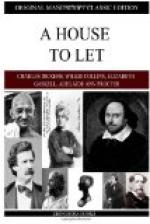XVII.
Now Christmas Eve returning,
Saw Bertha stand beside
The altar, greeting Dora,
Again a smiling bride;
And now the gloomy evening
Sees Bertha pale and worn,
Leaving the house for ever,
To wander out forlorn.
XVIII.
Forlorn—nay, not so. Anguish
Shall do its work at length;
Her soul, pass’d through the fire,
Shall gain still purer strength.
Somewhere there waits for Bertha
An earnest noble part;
And, meanwhile, God is with her,—
God, and her own true heart!
* * * * *
I could warmly and sincerely praise the little poem, when Jarber had done reading it; but I could not say that it tended in any degree towards clearing up the mystery of the empty House.
Whether it was the absence of the irritating influence of Trottle, or whether it was simply fatigue, I cannot say, but Jarber did not strike me, that evening, as being in his usual spirits. And though he declared that he was not in the least daunted by his want of success thus far, and that he was resolutely determined to make more discoveries, he spoke in a languid absent manner, and shortly afterwards took his leave at rather an early hour.
When Trottle came back, and when I indignantly taxed him with Philandering, he not only denied the imputation, but asserted that he had been employed on my service, and, in consideration of that, boldly asked for leave of absence for two days, and for a morning to himself afterwards, to complete the business, in which he solemnly declared that I was interested. In remembrance of his long and faithful service to me, I did violence to myself, and granted his request. And he, on his side, engaged to explain himself to my satisfaction, in a week’s time, on Monday evening the twentieth.
A day or two before, I sent to Jarber’s lodgings to ask him to drop in to tea. His landlady sent back an apology for him that made my hair stand on end. His feet were in hot water; his head was in a flannel petticoat; a green shade was over his eyes; the rheumatism was in his legs; and a mustard-poultice was on his chest. He was also a little feverish, and rather distracted in his mind about Manchester Marriages, a Dwarf, and Three Evenings, or Evening Parties—his landlady was not sure which—in an empty House, with the Water Rate unpaid.
Under these distressing circumstances, I was necessarily left alone with Trottle. His promised explanation began, like Jarber’s discoveries, with the reading of a written paper. The only difference was that Trottle introduced his manuscript under the name of a Report.
TROTTLE’S REPORT
The curious events related in these pages would, many of them, most likely never have happened, if a person named Trottle had not presumed, contrary to his usual custom, to think for himself.




